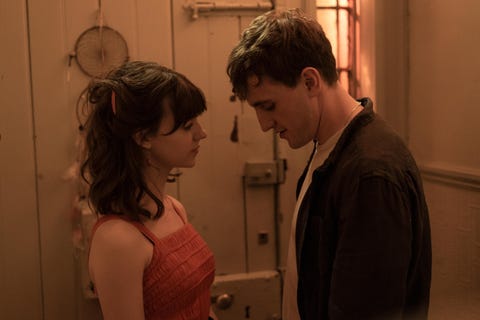It’s impossible to have a conversation about pop culture in 2020 without bumping into Sally Rooney. You know the drill: She’s the millennial voice of a generation. She’s overrated. She’s a
literary genius. She’s a glorified romance novelist. Wherever you stand on her contribution to literature, there’s little argument when it comes to the TV show that brought her most recent novel to life: Normal People is a vivid study of young love and all the delirious crises of misinterpretation that come with it. Though Rooney is the architect of perfectly frustrating lovers Marianne and Connell, she got an assist in bringing them to the screen. Enter Alice Birch, the British playwright quickly becoming the most in-demand screenwriter on both sides of the Atlantic.
“I never wanted to write film and telly,” she tells me over a midweek Zoom call, her agitated fingers never far from the gold pendant hanging from her neck. “I thought I was going to be a playwright. My mother was worried. That was it.” Her fear was unwarranted: Birch, 33, has written some of the most innovative plays to hit the London stage in the last decade, gathering a collection of impressive drama prizes and descriptors like “a cluster-bomb of subversion” (2016’s Revolt. She Said. Revolt Again); “a gift for radical experiment” (Anatomy of a Suicide, 2017); and “a finely-shaded compendium of emotional pain” ([Blank], 2019). “It's all about language for me, and words,” she says. “I'm endlessly interested in that—trying to find the most specific, correct words and being really, really meticulous about it.” Her first screenplay, 2016’s Lady Macbeth, catapulted actress Florence Pugh to stardom and won Birch the BAFTA for Best Screenplay the following year. Normal People, Birch’s first foray into television scriptwriting, brought her and Rooney their first Emmy nomination: Outstanding Writing for a Limited Series.
For Birch, the possibilities took shape in the two days she spent devouring the novel. “I felt profoundly moved by the end of it, that I had been on something with these characters,” she says. “[I] did something I never do: Emailed my agent and said, ‘Is this being adapted? I want to do it.’” Rooney was supposed to write the screenplay by herself, but the 12 scripts were too much for one person. “Sally had done drafts, and they were brilliant drafts. Novelists don't always make excellent screenwriters,” Birch says.
She met the author in Dublin, where Rooney gave her the Normal People tour of the city—“It was like, ‘These are the steps where they have their conversation about this, and I think he lives in that flat up there, and she lives over here’”—but their collaboration was an isolated affair, with each sending notes upon submission of the other’s draft. Birch does most of her writing late at night—”it feels a bit more like there’s permission”—and always, always, always alone. “I read sometimes about writers sitting next to each other, or opposite each other, and I just start panicking. There's something so intimate about it, and terribly vulnerable and private.”
The same could be said of the plot of Normal People, one of misinterpretation and unsaid affection—a striking departure from the riotous rage of Revolt. She Said. Revolt Again or the desperate, cruel rebellion of Lady Macbeth. “I don't really think about anyone reading it or what the end bit of the process is, so that allows me to stay very much inside the characters and inside their psychology,” Birch admits. For Normal People, she wrote to executive producer and director Lenny Abrahamson’s style: intimate close-ups that put you right inside the characters’ heads. “The directions in the writing were very small, like, ‘She presses her lips together,’ or ‘Pushes her tongue against the inside of her cheek.’ It's about like, fingers and mouth. It can all be quite delicate.”
Birch and Rooney are nominated for episode 3, which sees Connell snub Marianne as his date for the school dance—and almost immediately regret it. His agonized phone call in the episode’s final moments is an acute image of unmitigated remorse. But it’s the last two scripts Birch wrote solo—10, “the therapy episode” and the finale—that demonstrate her affinity for probing the depths of human connection. “That was the episode when they first called and said, “Do you want to be involved?” I was like, ‘I want to write that.’ I felt like I knew how to do that.” The episode sees Connell, rocked into near-paralysis by the suicide of an old friend, seek out a therapist on the advice of his concerned roommate. “We really had to work hard to earn that: To be able to feel like this character was in a space where he was able to suddenly say all this stuff he'd been holding onto,” she says. The result is a rush of raw emotion, a cathartic release of all the dodging and miscommunications built up over the previous five hours. Actor Paul Mescal, who lives near Birch in the city (“I see him, like, doing his running,” she grins) earned an Emmy nom for his performance.

As for the finale, it marks the most obvious departure from its source material, giving Marianne more agency and the couple’s future an overall ambiguity. “It felt kind of like synesthesia, where we knew what it should feel like, but couldn't quite find the words,” Birch says. “Every line of dialogue for ages felt like it was much too blunt or crass or on the nose. [It needed to feel like] these two people had finally learnt how to talk to each other, and how to sit with the unspoken stuff without misinterpreting each other constantly—that there was a total understanding. That should feel really profound, and the experience of it should be the same as the book, even if it's slightly different plot-wise.”
But Normal People isn’t Birch’s very first TV experience.In the kind of opportunity that would be cliché in a script about Hollywood dreams come true, Jesse Armstrong, the British creator of HBO’s mega-hit family drama Succession, had seen Lady Macbeth and recruited Birch to join the show’s second season as story editor. Her title allowed her access to the writers’ room, but she didn’t write any of the scripts, and refuses to takeanycredit for the series’ brilliance—despite winning a Writer’s Guild Award for Outstanding Drama alongside the rest of the writers. “It's [Jesse’s] baby, those are his characters, he owns them, but he creates an atmosphere where everyone has permission to pitch ideas about these characters and what might happen to them,” she says. “What should be exceptionally intimidating, there might be an hour where people are just telling jokes, trying to find the right joke for that character in that moment. It’s a very gentle room given that the show is so fucking not gentle.”
The Roys, a hyper-dysfunctional media family in the vein of the Murdochs, are brash, abusive, and unable to connect on the same plane. The concept of a “writers’ room”—the kind of place where, yes, writers work side by side—is more American than British, but Armstrong transported his to the South London neighborhood of Brixton. “The paper all over the wall, and the images all over the wall, sort of look a little bit like drunk people did it,” Birch says wistfully. “We could constantly hear some fight happening outside, or traffic—you know, London—and that feels really baked into it. Shows about wealthy people often just look so rich on the screen, sort of like you can't almost look at it, whereas Succession isn't like that. There's a kind of pragmatism which I really enjoy.”
(For the record, she has no idea how a copy of Rooney’s first novel, Conversations with Friends, ended up in Shiv’s hands in the season 2 finale: “That’s some brilliant props person. Shiv is, of all the Roys, most likely to be engaging with Sally Rooney, but even that's a little generous.”)
Now that Normal People is out in the world and nominated for four Emmys (Succession has 18), Birch is deep in several projects. "It's that funny thing of being a freelancer, the potential to always be working, I feel a lot,” she says. "I'm not very good at switching off.” There's Dead Ringers, the Amazon series starring Rachel Weisz as twin gynecologists, role(s) originated by Jeremy Irons in David Cronenberg's 1988 psychological thriller. And of course, she's working on the adaptation of Conversations with Friends, another collaboration with Abrahamson, Hulu, and BBC Three. In fact, she just submitted a draft of an episode. “At first it felt like we were cheating on Connell and Marianne,” she grins. “It's the same world and they feel like they're in conversation with each other, though it's not intentional. You sort of keep expecting them to show up.”



